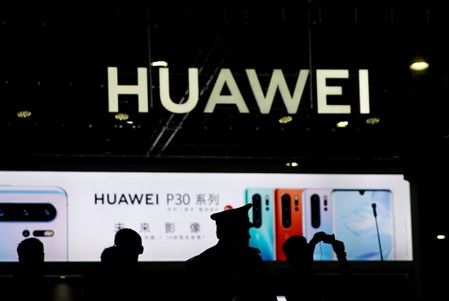

By Sijia Jiang and Yimou Lee
HONG KONG/TAIPEI (Reuters) – U.S. President Donald Trump’s decision to allow U.S. firms to sell “high tech” products to Huawei led Asian investors to snap up shares in suppliers to the Chinese smartphone maker on Monday, even as some experts wondered what had changed.
Huawei was put on a U.S. list in May that restricts U.S. tech firms such as Alphabet Inc’s <GOOGL.O> Google from doing business with the Chinese telecom network gear maker, viewed as a security risk by Washington amid trade tensions with Beijing.
Trump said on Saturday the ban was unfair to U.S. suppliers, who were upset that they could not sell parts and components to Huawei without U.S. government approval.
However, he did not say which U.S. firms could resume supplying Huawei.
While analysts had doubts about what it meant for the company, shares in Huawei’s smartphone suppliers jumped in Asian trading on Monday as investors saw Trump’s comments as a positive sign for its smartphone sales.
OLED display panel maker BOE Technology Group <000725.SZ> and Shenzhen Goodix Technology <603160.SS>, a maker of fingerprint sensors, climbed 10% to their daily limit.
Taiwan’s Foxconn <2317.TW>, the world’s top contract electronics assembler, and contract chipmaker TSMC <2330.TW> rose 3% and 4% respectively.
“The White House’s apparent U-turn … is unlikely to give Huawei the products it really needs,” Richard Windsor, founder of independent research firm Radio Free Mobile, said in a note.
“And even if it did, it is quite possible that fatal damage has already been done to Huawei’s smartphone business,” he said.
Trump’s remarks were taken by some https://www.forbes.com/sites/davidphelan/2019/06/29/trump-surprises-g20-with-huawei-concession-u-s-companies-can-sell-to-huawei/#3f7ab74f1e21 tech bloggers https://www.pcworld.com/article/3405589/huawei-google-android-license-ban-lifted.html to mean that Google would be able to restore Huawei’s access to Play Store and apps.
Arthur Liao, a Taipei-based tech analyst at Fubon Securities, said it was unclear whether U.S. tech firms can deliver components for Huawei’s future products or just components for existing lines.
Shares in some other suppliers including Shennan Circuits <002916.SZ>, Luxshare Precision Industry <002475.SZ>, Shenzhen Sunway Communication <300136.SZ>, and OFILM Group Co Ltd <002456.SZ> also surged.
LOBBYING EFFORT
After saying for weeks that it has access to enough non-U.S. technology to carry on as usual, Huawei said last month it would take a $30 billion revenue hit.
“We acknowledge the U.S. president’s comments relating to Huawei and have no further comments at this time,” a Huawei spokesman told Reuters on Monday.
Several U.S. companies stopped supplying Huawei in recent weeks, but quietly lobbied the U.S. government to ease the ban, Reuters reported last month.
Memory-chip maker Micron <MU.O> said last week it had resumed some shipments to Huawei, and chip maker Intel <INTC.O> took similar action, according to the New York Times.
Google said last month it would not provide the Android operating system (OS) for Huawei phones after a temporary reprieve from the ban expired in August, but current models could still use the apps.
Windsor said Huawei’s access to Google mobile products could remain blocked despite Trump’s remarks.
“It is fairly easy to argue that Google Mobile Services is unique and only available from the U.S. and potentially could be considered a security threat depending on what data is going over those services,” he said.
A Google spokesman in Singapore declined to comment on Monday.
The sanctions also prevent U.S. telecom companies from buying network equipment from Huawei based on national security grounds. Huawei has denied its products pose a security threat.
“National security concerns will remain paramount,” National Economic Council chairman Larry Kudlow said on Sunday, adding that Trump’s decision to allow expanded sales of U.S. technology supplies to Huawei will leave the most sensitive equipment off limits.
(Reporting by Sijia Jiang in Hong Kong and Yimou Lee in Taipei; Additional reporting by Aradhana Aravindan in Singapore; Writing by Sayantani Ghosh; editing by Darren Schuettler)












